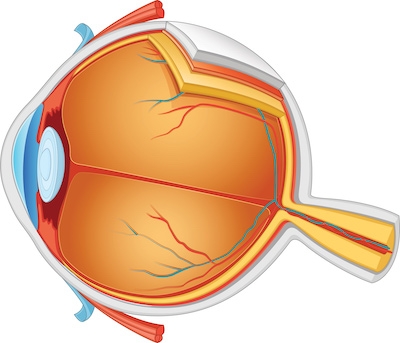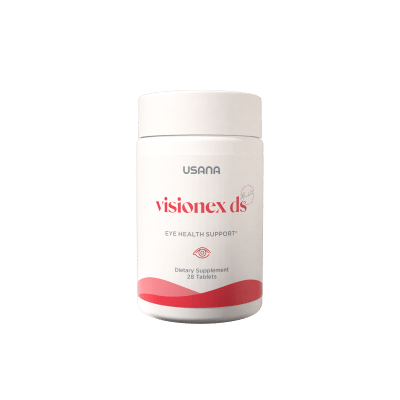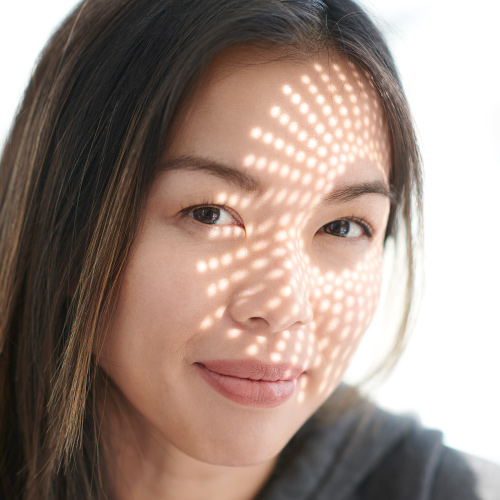USANA® Visionex® | Visionex DS
See the World Through Healthy Eyes with USANA Visionex® and Visionex DS*
USANA Visionex
Visionex DS
Focus on eye health with a vision-supporting supplement that delivers the nutrients your eyes need—vitamin C, zinc, lutein, and zeaxanthin.*
Your eyes are the window to the wonders of the world. So, don’t let exposure to the sun or screens dim your outlook. Focus on protecting your eye health and maintaining your vision with proper nutrition. Set your sights on the important nutrients found in USANA Visionex and Visionex DS.*
Ophthalmologists recommend a diet rich in fruits and vegetables to keep eyes in tip-top shape. And, many recommend adding an advanced eye-health supplement—with specific nutrients—to your daily routine. Visionex supplies nutrients your eyes need to stay sharp.
Visionex is loaded with vitamin C and zinc. It also delivers the phytonutrients lutein, zeaxanthin, and bilberry. Together, these ingredients support many aspects of health:*
- Maintaining long-term eye health by fighting free-radical damage*
- Acting as blue-light filters to help maintain good eye health and vision*
- Aiding the brain through neural support and antioxidant activity*
- Maintaining skin health by providing antioxidant defense and supporting collagen and surface lipids*
You can look out for your precious eyes with the nutritional support they require. The CellSentials will help provide a nutritional foundation for your overall health, which includes your eyes. And you can make maintaining healthy eyes a top priority by also including two tablets of Visionex in your daily supplement regimen. Or to get the same amount of lutein and zeaxanthin in only one tablet, try Visionex DS.*
Eye Anatomy 101
To understand how Visionex can help maintain good eye health, you first need to understand how vision works. The brain and your nervous system also get involved, but it all starts with your eyes.*
The human eye detects radiation (or light) in a specific part of the spectrum—visible light. Then your eyes can form images of objects either directly in front of you, or as far as many miles away. They can even respond to a single particle of light.
This is possible because of the high concentration of sensory receptors found in the eye. In fact, your eyes contain over 70 percent of all sensory receptors in the body.
But your eye is only collecting and focusing light. Your brain translates the messages the eye perceives so you can see the world around you. To understand vision, you need to know how the eye, brain, and optic nerves work together to visually interpret your world.

Processing of visual information begins in the retina and macula in your eye. What you actually see is the light that strikes the retina—a light-sensitive layer of cells at the back of the eye. In the center of the retina is the macula. The lenses in your eyes focus light on the macula.
This focused light initiates cell-signaling pathways. These pathways transmit light information from the eyes, through the optic nerves, to the primary visual cortex of the brain. That processing center is located at the very back of your head. Ultimately, this process creates images that help you perceive the world around you.
The Central Nervous System and Blood Brain Barrier
Your eyes are considered part of the central nervous system (CNS), because many parts of the eye actually begin as brain tissue during early embryonic development. Additionally, it takes many nerves, along with your brain, to perceive the light your eyes take in as physical objects. The fact that the eyes are part of the CNS is important, because all structures of the central nervous system are protected by something known as the blood-brain barrier.
This barrier consists of a highly selective, semi-permeable membrane that separates the circulating blood from the fluids and structures of the CNS. The blood-brain barrier is formed by especially tight connections between the cells that line blood vessels in and around the central nervous system.
The barrier protects these very delicate structures. To do so, it allows only a few select molecules, nutrients, and chemicals to pass. Not all nutrients make it through to the CNS. Thus, to get nutrients into the eye, you must selectively target compounds known to cross the blood-brain barrier.
To do their part in vision, your eyes depend on many nutrients to help you see the world around you. Take a look at some supplied by Visionex:
- Vitamin C: This powerful antioxidant and essential nutrient is found in fruits and vegetables. It supports healthy capillaries, gums, teeth, and cartilage. Vitamin C can be found in virtually every cell in the body, and its concentration is significantly higher in the retina than in the blood. Since the human body does not make vitamin C, it must be consumed as part of the diet.*
- Zinc: As an essential trace mineral, zinc is necessary for many aspects of health. And it’s found in high concentrations in the eye. It plays a critical role in transporting vitamin A to the retina. Zinc deficiency has been linked to poor night vision. This mineral appears to provide antioxidant protection and promote good visual acuity.*
- Lutein & Zeaxanthin: These two carotenoids are selectively transported across the blood-brain barrier and deposited in the macula of the eye. They serve as antioxidants, which help to neutralize free radicals and reduce oxidative stress. Additionally, they help filter out high-energy blue light to support visual acuity.*
- Bilberry Extract: The bilberry fruit is rich in antioxidants called anthocyanosides. Bilberry has also been shown to help maintain healthy capillaries, including those in the eye. Healthy capillaries are important because they deliver nutrients to eye tissue. The eyes need plenty of nutrition because vision churns through a lot of energy.*
Visionex harnesses the free-radical-fighting and vision-supporting benefits of these nutrients. And puts them to work for you. By armoring yourself with supportive nutrition, you will continue to support healthy vision and eyes.*
Visionex Works to Make You the Picture of Ocular Health*
The eye (especially the macula) is prone to photo- and oxidative-damage. This comes from multiple sources:
- Natural sunlight
- Artificial light from certain types of light bulbs or from computer screens and mobile phones
- Exposure to environmental pollutants
- Oxidants produced as a result of the high metabolic rate of the eye
Over time, these insults add up and there can be a general decline in visual acuity as you age.
A top concern are the damaging rays from the sun that enter the eye. Just like sunlight (ultraviolet radiation, to be specific) can burn and damage your skin, these same rays can damage structures of the eye.
This is an interesting dilemma for the eyes to balance. On one hand, eyes need to let light in so you can see. But on the other hand, they have to minimize how much light comes in to help protect against damage. To help combat the harmful effects of light, eyes developed an interesting mechanism—concentrating specific protective nutrients.
Some of these nutrients include vitamin C, zinc, lutein, zeaxanthin, and the flavonoid bilberry. Flavonoids, which are a type of plant compound, and vitamin C help promote healthy blood vessels to ensure nutrient delivery. Vitamin C and zinc work together to provide antioxidant protection. Zinc additionally helps to transport vitamin A, an essential nutrient for vision, into the eye. *
The central portion of the macula contains a dense, yellow pigment called macular pigment. This helps protect the sensitive light receptors in the macula from the potentially harmful effects of high-intensity, shorter wavelengths of light (also referred to as blue light). The nutrients that make up this macular pigment are carotenoids, including lutein and zeaxanthin.
A Quick Guide to Carotenoids
Carotenoids make up a very large family of over 750 naturally-occurring plant pigments. They are the compounds in fruits and vegetables that tend to give them their red, orange, and yellow color. With all the different carotenoids found in nature, the eye has developed the ability to specifically and selectively concentrate lutein and zeaxanthin in the eye, specific neurons involved in vision, and certain regions of the brain. Together with these other nutrients, the eye is well equipped to cope with daily stresses.
Because your body cannot make lutein, zeaxanthin, vitamin C, zinc, and bilberry, they must be obtained from the diet or a nutritional supplement. Research has shown that levels of these eye-protecting nutrients correlate to the amount you consume. So, levels of these nutrients increase in a few days and continue to increase as long as they are being consumed. Unfortunately, once consumption of these nutrients stops, levels begin to decline as rapidly as they increased. Therefore, it is important to consistently eat a healthy diet and take a nutritional supplement that supports eye health.*
As you age, macular pigment density tends to decline. Research over the past twenty years has been geared toward understanding how this age-related decrease is related to nutrition. Now scientists have a better understanding of how nutrition helps support vision and maintain long-term eye health.*
The first AREDS research (Age-Related Eye Disease Study) was sponsored by the National Eye Institute. Previous studies linked eye health and nutrition, but AREDS sought to more deeply explore the potential connection.
For study participants, the tie between eye health and a daily recommended intake of nutrients like vitamin C, zinc, lutein, and zeaxanthin was strong. The results of the first AREDS confirmed the link between nutrition and eye health. And additional studies support the findings.*
The formula of Visionex is no accident—it’s based on solid science, including AREDS. Vitamin C, zinc, lutein, and zeaxanthin can help lighten the load of ocular burdens. They reinforce the health of macular pigment to protect your eyes from damaging sunlight. And as antioxidants, they maintain your eyesight by defending against oxidative damage to the delicate tissues of the eye caused by light.*
Along with Visionex, eating a healthy diet and practicing eye-protective habits can help your eyes stay healthy, even as you age. That means avoiding direct exposure to the sun by wearing sunglasses. You should also take regular breaks from computer and smartphone screens.
Keep Your Vision Sharp Through the Power of Visionex*
Your eyes guide you through your world, so their health can have a noticeable impact on your life. Healthy eyes ensure high visual performance across situations like driving a car or playing sports.
Since time in front of computer screens and cell phones is on the rise, it is necessary to protect your eyes from stress and fatigue. You want your eyes to perform well while you are working. But you also need them to be on top of their game when you get behind the wheel or step onto the field.
Scientific research has shown that nutritional interventions (like dietary supplementation) can help support visual performance.
A 2005 study put this theory to the test with 40 young, healthy subjects (average age of 23.9 years). They were assigned to receive daily supplements of lutein (10 mg) and zeaxanthin (2 mg) for six months. The subjects’ eyes were then tested for the effects of glare as experienced in everyday situations. That included being outdoors on bright days, lengthy sessions of computer time, and nighttime exposure to oncoming headlights.
Following the six months of supplementation, the participants saw positive impacts on macular pigment optical density (MPOD) when compared to average values at the beginning of the study. MPOD levels have been linked with visual acuity. After testing the subjects for their performance on visual tasks, researchers concluded that four to six months of lutein and zeaxanthin supplementation supports visual performance in high-glare situations.
Supplementation with the lutein and zeaxanthin in Visionex can help preserve visual function. Use of these important carotenoids has a number of benefits:*
- Sustains tolerance to and recovery from exposure to bright light*
- Supports visual acuity in low-light or hazy conditions*
- Can help maintain healthy vision by making edges appear clearer*
Reboot your eye health with the nutrients found in Visionex. The lutein and zeaxanthin in USANA’s eye supplement helps support the blue light-filtering power of the macula and provides antioxidants to fight off oxidative damage.*
Think Visionex For Extra Brain Benefits*
The benefits of Visionex extend beyond your eyes. That’s because lutein and zeaxanthin can cross the blood-brain barrier. So, after these carotenoids are deposited in the macula, they also have work to do supporting healthy brain function.*
What accounts for the cognitive effects? Your brain puts lutein and zeaxanthin to use helping to optimize the speed and efficiency of sending messages in your brain.*
The first way this may work is supporting the speed at which signals are sent down a neuron. This could be the result of the antioxidant properties of lutein and zeaxanthin shuttling electrons and other signals along the neuron.*
The second possibility is that lutein and zeaxanthin support specific cell-signaling pathways. These pathways turn on the gene responsible for holding neurons tightly against each other at connections called tight junctions. Think of these as the glue that keeps cells in close contact. More glue means a strong, tight connection.*
Why would this connection be important? Neurons need to send messages down the length of their cells, as well as between cells. The tighter the connections, the more efficiently the signal is sent and received. Supporting signaling efficiency equals optimal cellular communication.*
Increasing the amount of this cellular glue may help the brain form new connections and cell-signaling pathways. Both are very important for learning and memory.*
Because it supports the brain’s ability to send and receive messages, Visionex is an excellent companion product to CopaPrime+, which uses USANA InCelligence Technology™ to support peak cognitive function.*
Research has shown high levels of circulating carotenoids, specifically lutein and zeaxanthin, support many brain functions. They include the following:*
- Learning
- Memory
- Verbal fluency
- Reaction time
- Balance
- Neural efficiency (processing speed)
Eye-Spy Youthful Skin with Help from Visionex
Lutein and zeaxanthin also offer benefits for supporting your skin’s healthy appearance. They do this by increasing surface lipids (fats) and enhancing natural antioxidant activity. By concentrating in the skin, they help provide protection from light to reduce the visible effects of the sun.
By promoting lipid production, lutein and zeaxanthin foster healthy cell growth. Skin cells are some of the fastest growing cells in the body. So, they need the support of nutrients like lutein and zeaxanthin to guard your body with a beautiful and protective outer layer.*
The vitamin C in Visionex acts as an antioxidant and also supports the synthesis of collagen, which is an important structural protein in the skin.*
The antioxidants in Visionex help protect skin from a dry or prematurely wrinkled appearance that could be caused by environmental exposure. When paired with a broad-spectrum sunscreen applied to the skin to defend against the effects of the sun, Visionex can help maintain your healthy glow from the inside.*
Key Ingredients
- Vitamin C
- Zinc
- Lutein
- Zeaxanthin
- Bilberry Extract
See full list of ingredients
Usage
Take two (2) tablets of Visionex daily, preferably with food. Or take 1 tablet of Visionex DS daily, preferably with food.
Ideal For
- All healthy adults
- Athletes
Frequently Asked Questions About Visionex
None! Submit your question below.
References
American Optometric Association
https://www.ncbi.nlm.nih.gov/pubmed/11594942
https://www.ncbi.nlm.nih.gov/pubmed/15787426
https://www.ncbi.nlm.nih.gov/pubmed/25251377
https://www.ncbi.nlm.nih.gov/pubmed/25483230
https://www.ncbi.nlm.nih.gov/pubmed/14711439
https://www.ncbi.nlm.nih.gov/pubmed/14984308
https://www.ncbi.nlm.nih.gov/pubmed/26540073
https://www.ncbi.nlm.nih.gov/pubmed/15129301
https://www.ncbi.nlm.nih.gov/pubmed/26286605
https://www.ncbi.nlm.nih.gov/pubmed/15953116
https://www.ncbi.nlm.nih.gov/pubmed/15824226
https://www.ncbi.nlm.nih.gov/pubmed/23840953
https://www.ncbi.nlm.nih.gov/pubmed/18510807
https://www.ncbi.nlm.nih.gov/pubmed/22045492
http://agris.fao.org/agris-search/search.do?recordID=US9601276
https://www.ncbi.nlm.nih.gov/pubmed/11684226
https://jandonline.org/article/S0002-8223(07)01187-X/abstract
https://www.ncbi.nlm.nih.gov/pubmed/26317757
https://www.ncbi.nlm.nih.gov/pubmed/24247062
https://www.ncbi.nlm.nih.gov/pubmed/25024317
https://www.ncbi.nlm.nih.gov/pubmed/21440663
https://www.ncbi.nlm.nih.gov/pubmed/24148268
https://www.ncbi.nlm.nih.gov/pubmed/20492542
https://www.ncbi.nlm.nih.gov/pubmed/15117055
https://www.ncbi.nlm.nih.gov/pubmed/15762089
https://www.ncbi.nlm.nih.gov/pubmed/18296924
https://www.ncbi.nlm.nih.gov/pubmed/17306793
https://www.ncbi.nlm.nih.gov/pubmed/24691400
https://www.ncbi.nlm.nih.gov/pubmed/18334754
https://www.ncbi.nlm.nih.gov/pmc/articles/PMC5138207/
https://www.ncbi.nlm.nih.gov/pmc/articles/PMC6164534/
https://www.ncbi.nlm.nih.gov/pmc/articles/PMC3606807/
https://www.ncbi.nlm.nih.gov/pubmed/19168000
https://www.ncbi.nlm.nih.gov/pmc/articles/PMC5063591/
https://www.ncbi.nlm.nih.gov/pmc/articles/PMC3257702/
https://www.ncbi.nlm.nih.gov/pubmed/11880562
https://www.ncbi.nlm.nih.gov/pmc/articles/PMC6028556/
https://www.ncbi.nlm.nih.gov/pubmed/27662341
https://pdfs.semanticscholar.org/4f8c/334b9cc43af277c2d40ce57926d4b1b0e05d.pdf
You May Also Enjoy
10 Reasons Why Being Outside is Important
From forest bathing to walks in the park, experiencing nature can help many facets of your health. Discover 10 reasons why being outside is important.
How Technology and Light Affects Sleep
Escaping computers and smart phones is tough during the day. See why it’s essential to avoid their blue-light emissions at night so you can sleep.
Risky Business—Protecting Your Skin from the Sun
The sun provides heat, light, and happiness. But too much of a good thing can be harmful. See how to practice safe sun exposure.
*These statements have not been evaluated by the Food & Drug Administration. This product is not intended to diagnose, treat, cure, or prevent any disease.









